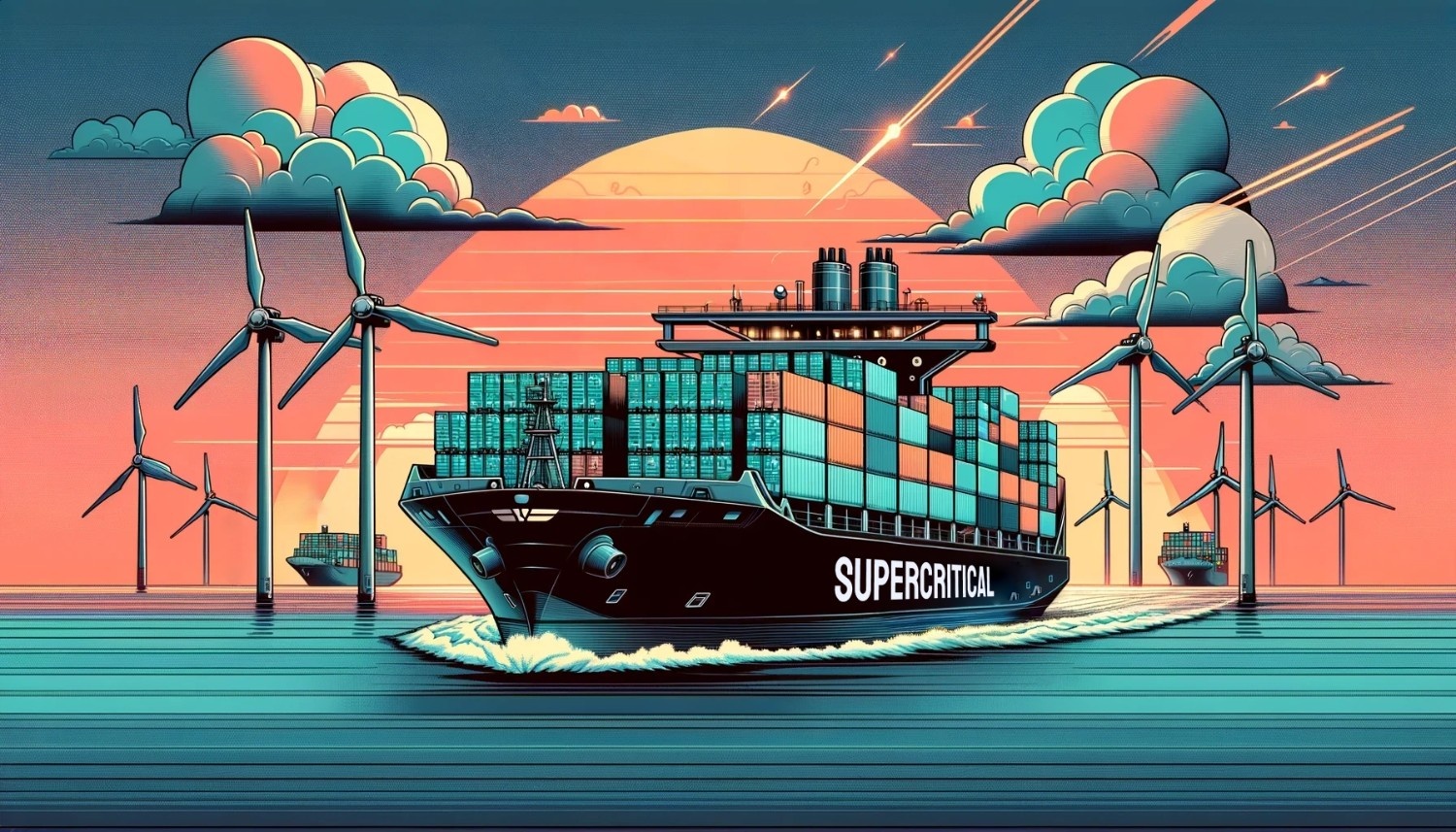This week in London, the Extraordinary Marine Environment Protection Committee of the IMO meets to decide on the adoption of the Net Zero Framework (NZF). Adoption of the NZF would make the shipping industry a leader in Net Zero ambition: the first ever to have binding emissions reduction mandates.
Supercritical stands with industry leaders across shipping, renewables, and the e-fuels sectors in support of the Net Zero Framework. This is a once in a generation opportunity to bring shipping emissions down, in line with a 2050 target for Net Zero. The NZF is a key first step in increasing the use of e-fuels: building scale and supply chains now, so e-fuels can provide cheap and sustainable fuel well into the future.
According to the IMO’s latest GHG Study (2020), the total GHG emissions of the shipping industry was 1,076 million tonnes in 2018 [1]. Due to the continuous increase in global maritime trade, emissions in this sector are a growing issue, with a 9.6% increase in GHG emissions from 2012-2018. Emissions from this sector, as of 2018, make up 2.89% of total global anthropogenic emissions, roughly equivalent to the entire emissions output of Japan [2].
As the global regulator for the shipping industry, the IMO’s member states have the power to adopt the NZF. This would, for the first time, enforce globally binding regulations to reduce greenhouse gas (GHG) emissions within shipping, with the aim of achieving Net Zero by 2050 [3]. If passed with two-thirds of eligible (present and party to the MARPOL treaty, Annex VI) member states in support, the measures will enter into force from Spring 2027, effective 1st January 2028. To do this, the NZF would adopt Global Fuel Standards (GFS), requiring successive reduction in the GHG intensity of shipping fuels [4]. A minimum 20% reduction by 2030, 70% by 2040, and the achievement of a Net Zero industry by 2050. Additional schemes will be set up to aid in the fuels transitions, and a credit trading scheme will be implemented, whereby vessels with lower emissions can sell carbon credits to higher emitting vessels.
Whilst the adoption of the NZF will be a significant step towards achieving Net Zero in the shipping industry, fears regarding member-state compliance and insufficient support for e-fuels remain.
The US administration has declared strong opposition to the NZF, describing the proposal as a “European-led neocolonial export of global climate regulations” which would cause "disastrous" economic impacts [5]. In an attempt to thwart a vote in favour, the US has threatened significant action against nations that support the framework: blocking vessels from entering U.S ports, sanctioning officials and imposing visa restrictions, commercial penalties, and additional port fees. In the first day of the IMO session, roughly 15 nations have voiced concern over the framework, including fossil-fuel nations such as Saudi Arabia and Russia [6]. Although there are strong reasons to worry about compliance from all member states, there remains widespread support for the NZF, with at least 46 nations making positive statements in support of the framework.
Regarding e-fuels support, the NZF does set a specific target of 5% zero or near-zero fuel (ZNZs) use by 2030 and states that a portion of revenues raised will be earmarked for the reward of ZNZs use, incentivising investment to increase the commercial maturity of e-fuels.
However, there is a lack of detail that risks undermining the long-term prospects of e-fuel use. For instance, the definition of ZNZs relates to the GHG emissions intensity only (19gCO2e/MJ till 2035, then 14gCO2e/MJ) and there has been no differentiation between solutions [7]. Thus, even though bio-fuels face considerable constraints on sustainable supply of their feedstock relative to future shipping demand, it would be considered of the same class as fuel derived solely from renewables, e-fuels, which are eminently scalable. There is a risk that, without further distinguishing between types of ZNZs, the IMO rewards and over encourages use of transitional fuels in the short term to the detriment of investment in e-fuels, compromising their ability to emerge as the lowest-cost option as quickly as possible.
Supercritical is already at the forefront of e-fuels development, working with key partners on e-methanol and green ammonia development.
We are currently working on a groundbreaking e-methanol project, evaluating the impact of integrating Supercritical’s high pressure, ultra-efficient, membraneless electrolyser into HAMR Energy’s hybrid methanol plant design [8]. This pioneering consortium will de-risk the concept for progression to pilot stage and, in the coming years, commercial deployment of Supercritical’s technology.
Furthermore, Supercritical has successfully completed a study into green ammonia, GreeNH3, in partnership with Scottish Power, Proton Ventures, and the Department for Energy Security & Net Zero [9]. This project explored the feasibility of integrating Supercritical’s electrolyser into a traditional Haber-Bosch ammonia synthesis loop, designed by Proton Ventures, for the production of ammonia at demonstrator and commercial scale. Findings show that Supercritical’s LCOH at 200 bar is predicted to be significantly lower than current incumbent technologies at commercial scale, resulting in a favourable levelised cost of ammonia.
Supercritical’s experience highlights the fact that if the NZF is passed, hydrogen (and derivatives) producers will be better positioned to secure commercial offtake and solidify supply chains, stimulating the investment needed to continue the important innovation already underway. An early transition, supported by global regulation, is critical to the future competitiveness of e-fuels and driving long-term emissions strategy within the industry.
Want to speak to one of our team about how our technology could drive down the cost of your marine fuel? Contact sales@supercritical.solutions.
Author: Rebecca Tekleyesus, Commercial and Market Analyst, Supercritical Solutions
[1]https://wwwcdn.imo.org/localresources/en/OurWork/Environment/Documents/Fourth%20IMO%20GHG%20Study%202020%20-%20Full%20report%20and%20annexes.pdf
[2]https://www.energypolicy.columbia.edu/publications/practical-gaps-in-the-international-maritime-organizations-net-zero-framework/
[3]https://www.imo.org/en/mediacentre/pressbriefings/pages/imo-approves-netzero-regulations.aspx
[4]https://globalmaritimeforum.org/oped/shippings-new-net-zero-framework-where-to-next/
[5]https://www.state.gov/releases/office-of-the-spokesperson/2025/10/taking-action-to-defend-america-from-the-uns-first-global-carbon-tax-the-international-maritime-organizations-imo-net-zero-framework-nzf
[6]https://www.hydrogeninsight.com/transport/green-hydrogen-shipping-boom-majority-of-countries-in-favour-of-imo-net-zero-framework-on-first-day-of-crucial-meeting/2-1-1886464
[7]https://www.u-mas.co.uk/wp-content/uploads/2025/05/UMAS-Assessing-the-IMOs-Net-Zero-Framework-1.pdf
[8]https://www.supercritical.solutions/post/hamr-energy-and-supercritical-to-shake-up-the-world-of-methanol-with-groundbreaking-government-backed-green-partnership
[9]https://www.supercritical.solutions/case-studies/greenh3











